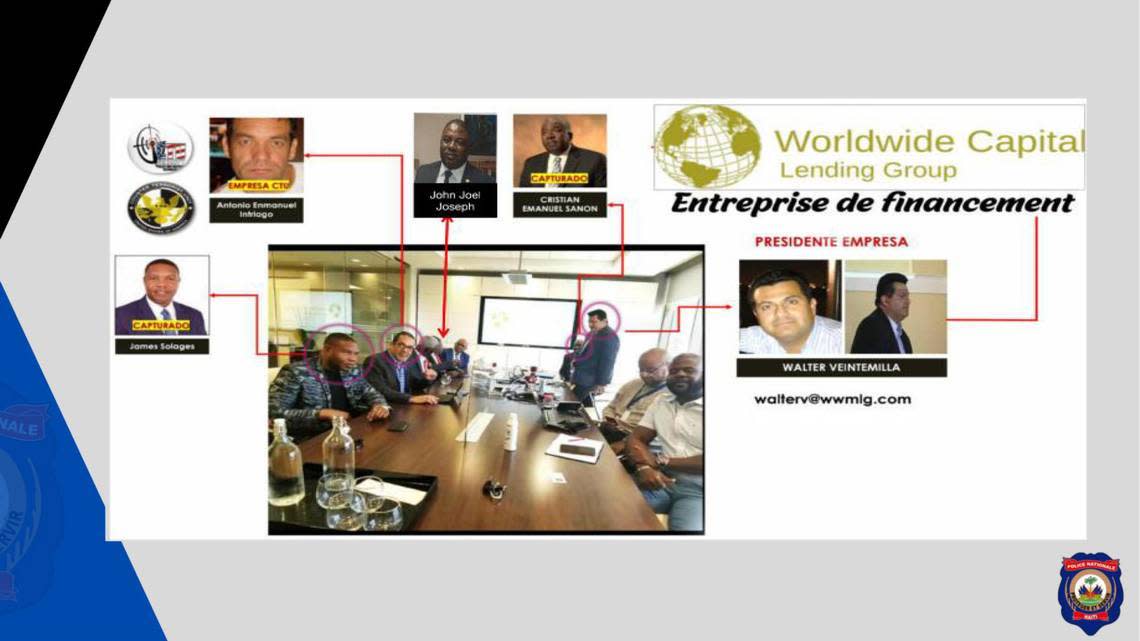Haiti judge investigating president’s assassination orders mayor’s arrest. More possible
The mayor of a seaside Haitian beach town who flew to South Florida to meet with a politically ambitious Haitian-American pastor and others now accused in the July 2021 assassination of Haitian President Jovenel Moïse was himself arrested Monday in Port-au-Prince in connection with the brazen killing.
Marky Kessa’s arrest was ordered by the Haitian judge overseeing the investigation, a law enforcement source confirmed to the Miami Herald.

Kessa is now among at least seven participants in a meeting at the Tower Club in downtown Fort Lauderdale in early April 2021 who are now jailed, either in Haiti or Miami. Haitian authorities have long alleged that the Broward meeting played a key role in the plot to kill Moïse, who was shot inside his bedroom after a group of Colombian commandos, accompanied by two Haitian Americans and local police, stormed his residence in the middle of the night.
His wife, Martine, who was home at the time with their two children, was injured while the kids were unharmed.
Arrestation ce lundi de Macky Kessa, agent exécutif intérimaire de la commune de Jacmel, après son audition dans l’enquête relative à l’assassinat du président Jovenel Moïse. C’est le magistrat instructeur Walther Wesser Voltaire qui a ordonné cette arrestation, confirme son… pic.twitter.com/0zpuPDy60w
— Passion Info Plus (@passioninfoplus) November 20, 2023
Kessa’s arrest was ordered after he appeared before Judge Walter Wesser Voltaire, whose inquiry into the shocking and still-unsolved presidential murder has picked up steam over the past week.
Neither Voltaire nor Haiti National Police have given an explanation for the arrest. It is the first significant action taken by Voltaire since he became the fifth investigative judge to lead the inquiry a year and a half ago. The investigation has been characterized by high turnover of judges and allegations of corruption.
The mayor’s arrest isn’t expected to be the last in Haiti, where 17 people, Colombians and others, are in custody but awaiting formal charges more than two and a half years after the assassination.
In the United States, a parallel investigation has already resulted in three suspects pleading guilty, with a fourth, Joseph Vincent, expected to do so on Dec. 5.
Voltaire, in recent days, has both ordered a cadre of new suspects to appear before him and quietly issued arrest warrants. He has also summoned five others to appear before him to give testimony with the possibility of arrest in connection with the case. They include the former secretary general of the National Palace, Lyonel Valbrun.
Valbrun must appear before Voltaire on Tuesday.
Valbrun worked for Moïse before being sacked by Prime Minister Ariel Henry after he called diplomats in Port-au-Prince and declared himself president months into Henry’s tenure. He’s accused of requisitioning a $3.4 million payment from Haiti’s finance ministry months before the president’s death.
The money was used to purchase security equipment from Matador, S.A., a company listed as providing development assistance but that sources told the Herald was selling firearms in Haiti despite a U.S. ban. The company is connected to Dimitri Hérard, who was the head of Moise’s presidential guards.
Hérard is among several former Haitian police officers jailed in Port-au-Prince after being accused of facilitating the killing by either standing down or not showing up for work.
READ MORE: How a Miami plot to oust a president led to a murder in Haiti
The progress in the Haiti investigation comes after months of stagnation and as the country struggles to move its investigation forward. In January, Voltaire agreed to the transfer of Vincent and two other Haitian American suspects, Christian Emmanuel Sanon and James Solages, and retired Colombian military officer Germán Rivera Garcia, to the United States.
Last month, the investigation in Haiti received a major boost when a key suspect, Joseph Félix Badio, was finally arrested after spending more than two years on the lam. Badio was taken into custody after a police officer spotted him inside a Petionville grocery store on Oct. 19.
Until now, Kessa had not been a primary target of the the inquiry, and was still operating as mayor in Jacmel, despite his official term ending. His city lay at the center of the defense of two South Florida businessmen, Antonio Intriago and Walter Veintemilla, who insist they had nothing to do with the presidential killing and were looking to get contracts to supply solar equipment in Jacmel following “a peaceful transition.”
READ MORE: Who was involved in killing of Haiti president Jovenel Moise?
The two have said that they were engaged in talks with Sanon, the South Florida pastor, about a redevelopment program to “save Haiti.” The discussions took place at the Tower Club, among other places in South Florida.
According to a Haitian police investigative report first obtained by the Herald, Kessa signed an agreement with Veintemilla, the owner of Worldwide Capital Lending Group, a Miramar-based company, that alleges it came onboard to help Sanon with financing for his development scheme.
Miami Herald federal courts reporter Jay Weaver contributed to this report.
